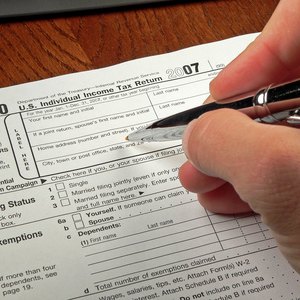
Many individuals expect to receive a tax refund after filing their annual tax returns. A refund is money that is owed to the taxpayer for amounts in excess of the required tax liability. This may be due to filing status, wages or other withholdings, deductions or credits.
The majority of American taxpayers file their taxes electronically and a majority of individuals expecting a refund will elect to receive that refund via direct deposit. The IRS indicates that 8 out of 10 taxpayers choose direct deposit to receive their tax refund. But how can you be sure you gave them the right account number to deposit the money? It's a good question.
What Is a Direct Deposit Refund?
While most taxpayers file their tax returns electronically, paper filers can also elect to receive a refund via direct deposit. All filers who are owed a refund can select a refund to be direct deposited into up to three bank accounts per return. The alternative is to receive a check via physical mail.
A taxpayer will have to provide at least one bank account number along with the associated routing number on the return. This can be done by entering this information into the tax software or by entering it directly on lines 35B through 35D of Form 1040, which is available on the IRS website.
Regardless of whether the return is paper-filed or e-filed, any refundable amount, including bank account information, will be recorded on Form 1040 between lines 34 and 36. The IRS will only issue paper checks for prior year refunds; direct deposit for a prior year will be rejected.
What if the Account Number Is Wrong?
It is important to verify bank account information before the tax return is sent to to the IRS. Once a return is accepted, it can be a headache to correct an error for the wrong bank account number. It is not necessary to amend the return if the only issue is incorrect direct deposit information.
A few things may happen as a result of recording the wrong IRS refund account on a tax return. The refund may be rejected by the financial institution, in which case the IRS will be notified and likely issue a check to the address attached to a prior year return for the same taxpayer. Alternately, the financial institution might accept the refund if there is an active account with the numbers provided.
How to Verify a Direct Deposit Refund
The simplest way to check on the status of a refund is to use the IRS website, specifically the page titled Where's My Refund, to verify if the IRS has issued the payment for a tax refund. The easiest way to verify a direct deposit bank account number is to review the Form 1040 that was filed.
IRS direct deposit Child Tax Credit payments were available as advanced payments in 2021. The IRS Child Tax Credit (CTC) portal was available for taxpayers eligible for the CTC to update bank information on record with the IRS. This portal was also available to manage advanced CTC payments and obtain Letter 6419.
If a return has not yet been accepted by the IRS, a taxpayer should immediately contact the IRS phone number to stop the direct deposit. A financial institution may return the funds to the IRS, which will then issue a check to the taxpayer using the last known address. If the financial institution is unresponsive, a taxpayer should request a trace on the payment.
If two weeks have passed since a taxpayer has reached out to a financial institution regarding an unreceived refund, a taxpayer should fill out Form 3911 and submit it to the IRS to initiate a trace on the refund. This will allow the IRS to contact the bank directly regarding the refund. Banks and other financial institutions are allowed 90 days to respond to the IRS.
It is important to understand that the IRS cannot compel an unresponsive or uncooperative bank to return a tax refund. It bears repeating to carefully verify bank account numbers and other personal information before filing a tax return.
References
Tips
- Check the status of your refund online at the IRS website, or call 1-800-829-4477.
Writer Bio
Hashaw Elkins is a financial services and tax professional, as well as a project management consultant. She has led projects across multiple industries and sectors, ranging from the Fortune Global 500 to international nongovernmental organizations. Hashaw holds an MBA in Real Estate and an MSci in Project Management. She is further certified in organizational change management, diversity management, and cross-cultural mediation.

